May 19, 2025 | 08:39 GMT +7
May 19, 2025 | 08:39 GMT +7
Hotline: 0913.378.918
May 19, 2025 | 08:39 GMT +7
Hotline: 0913.378.918
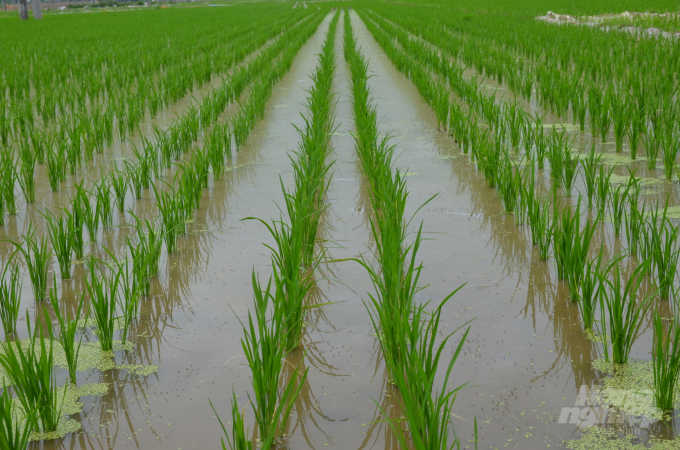
Rice is transplanted in wide rows, narrow rows. Photo: Duong Dinh Tuong.
When the Dong Cao Cooperative Group in Van Tien commune (Yen Lac district, Vinh Phuc province) began using border effect transplanting in 2012, it only ventured to produce two rods and did not anticipate the first harvest season.
Rice stalks on both sides of the narrow row droop down to the broad row, like a twisted fishing line, making the field owner desirous of returning. Thus, for the next harvest, the whole populace was ready to transplant in a prescribed way.
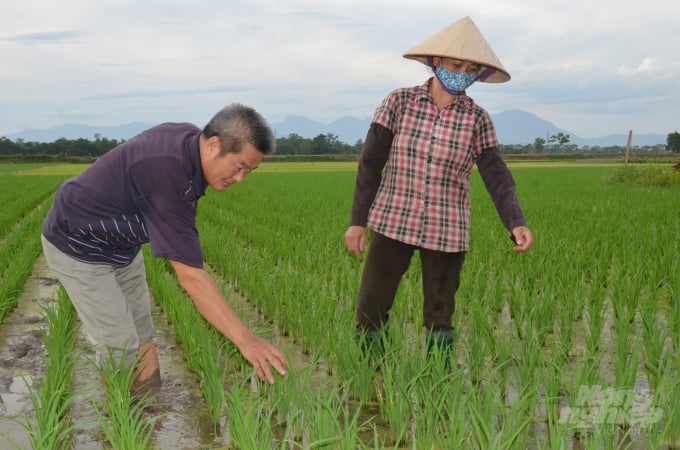
Le Thanh Hai - Leader of Dong Cao Cooperative Group in Van Tien Commune is inspecting a rice field in the village. Photo: Duong Dinh Tuong.
“At first, I was unfamiliar with the concept of stretching the line from beginning to finish of the field, but after I learned the technique, I only needed to extend it once and then estimate it visually.
Around 99 percent of the village's inhabitants now practice this kind of culture. This method of transplanting may significantly decrease costs associated with seed, transplanting, and weeding. The quantity of fertilizer used remains constant, but the yield surpasses 15%. Additionally, it controls a variety of pests and diseases, most notably powdery mildew and planthoppers.” Le Thanh Hai, a member of the Dong Cao Cooperative Group, said this.
According to Nguyen Nhu Thuyen, Head of the Plant Protection Plantation Station in Yen Lac district, engineer Chu Van Tiep invented growing rice in broad and narrow rows to produce boundary effects.
The technique was initially tested in the communes of Nguyet Duc and Van Tien. The prerequisite for using this method is that the soil is healthy since the transplanting is scarce and that the rice is very healthy, which is accomplished by fertilizing early, beginning with tillering.
To promote this novel technological solution, Yen Lac has provided each commune with a 1-hectare model, which is instantly rewarded with VND 100,000 for each rod. Later, as communes recognized the people's involvement, they were ready to spend their own money without waiting for the district. The method contributes to a 20-30 kg per rod improvement in production. Additionally, the border enables farmers to easily wade down to fertilize, the fields are well-ventilated, resulting in fewer pests and illnesses, particularly in the spring crop, and disease is decreased by 60%.
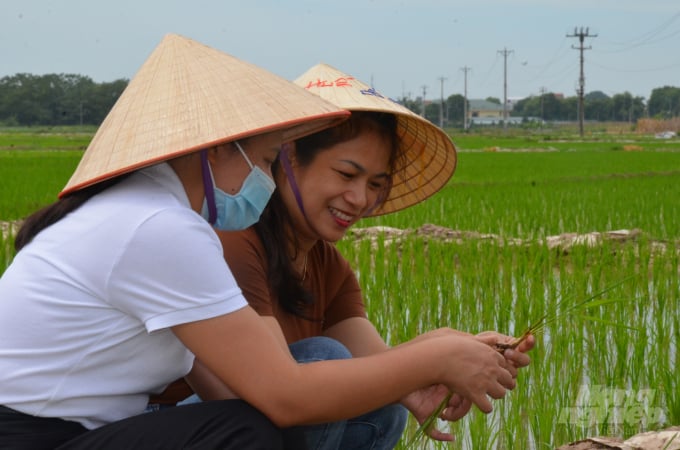
An officer of the Plant Protection Department of Vinh Phuc province inspects rice pests and diseases. Photo: Duong Dinh Tuong.
Responsible agriculture must begin with the direction of production. In contrast to Hanoi, which has many commune-level plant protection employees, Vinh Phuc and many other provinces lack employment opportunities. When the district plant protection station's personnel needed to compute the number of pesticides used, they could not verify the quantity sold by agents but had to guess by calculating the number of turns that persons spraying made and multiplied by the area.
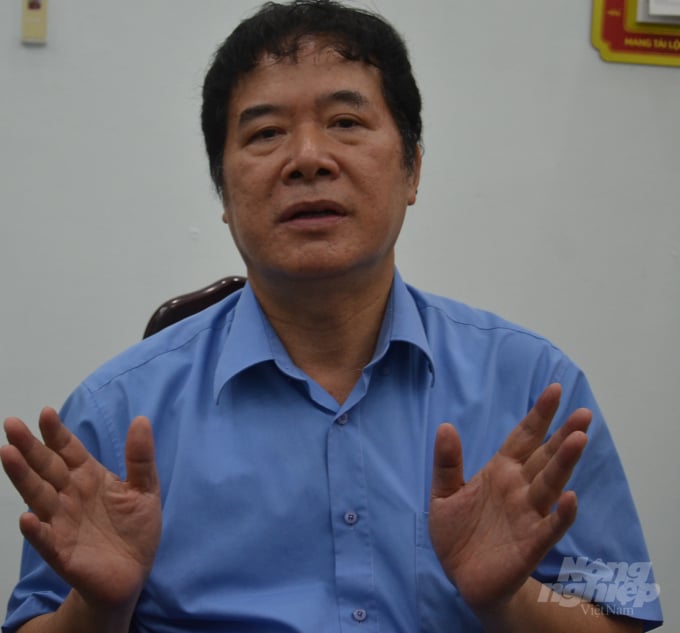
Le Van Dung, Deputy Director of Vinh Phuc Department of Agriculture and Rural Development. Photo: Duong Dinh Tuong.
Regarding organic agriculture, Vinh Phuc has a program for organic vegetable production in the period 2020-2022, led by the Sub-Department of Cultivation and Plant Protection, with a total investment of VND 28 billion, to execute 1,664 hectares per year using organic fertilizer at a rate of 50%. In 2021, the Agricultural Extension Center's VietGAP vegetable production program will implement 1,840 hectares by providing seeds, organic fertilizers, and biological pesticides worth VND15.4 billion.
“There was a period when the IPM program was largely neglected across the country; it was during a review conducted by the Ministry of Agriculture and Rural Development that I highlighted the subject of restoring it. Vinh Phuc immediately continued to do so when the ministry published a directive paper. I previously directed the Plant Protection Sub-Department to compile data on the number of families farming and the number of sprayers, and then to watch whether the number of sprayers decreased or the increased year after year.
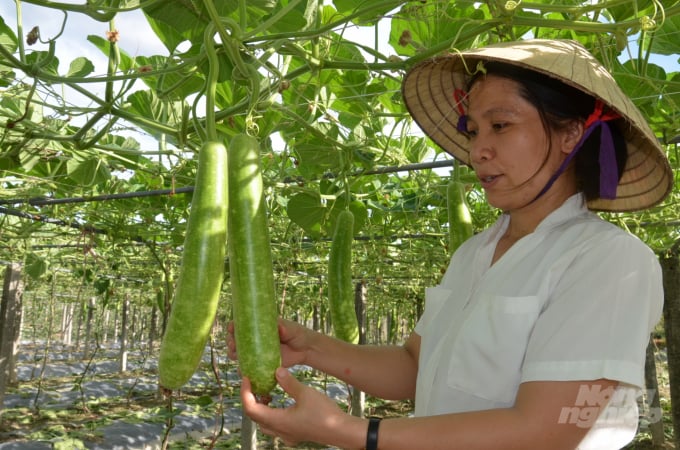
Safe vegetable production at Vinh Phuc Safe Vegetable Cooperative, Kim Long commune, Tam Duong district. Photo: Duong Dinh Tuong.
If it drops, my course is correct; if it rises, the converse is true. Indeed, the number of aerosols I see has been much decreased. The majority of rural households today have a few individuals working outdoors and others laboring in the fields. They continue to believe that they must first rescue themselves by cultivating rice, producing nutritious vegetables, and nourishing their family and loved ones. Le Van Dung, Vinh Phuc's Deputy Director of the Department of Agriculture and Rural Development, said.
According to data, Vinh Phuc province planted 29,500 hectares of spring crop, but only around 23,500 hectares of seasonal crop. There are tens to hundreds of hectares of fields that have been abandoned, particularly in abundant areas. Agriculture is being pushed farther and further into remote areas.
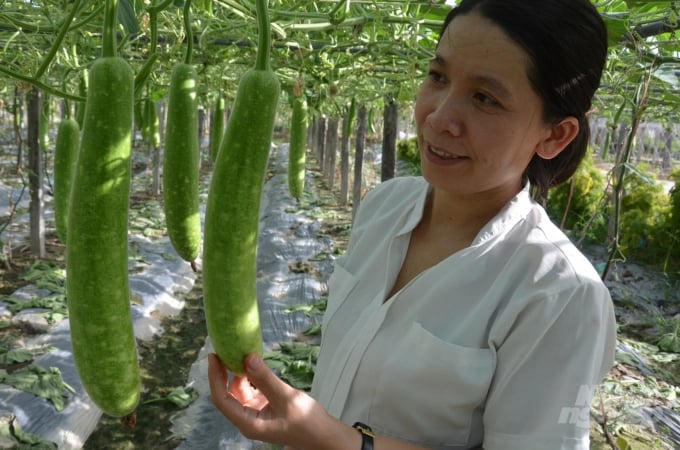
Kieu Thi Hue, Director of Vinh Phuc Safe Vegetable Cooperative is checking the gourd. Photo: Duong Dinh Tuong.
Until now, Kieu Thi Hue's Vinh Phuc Safe Vegetable Cooperative in Kim Long Commune, Tam Duong District has covered 100% of the goods for the community, allowing them to control everything from soil preparation to variety selection, care, and how the harvest adapting to the daily output.
The province also assisted participants via its program for organic production of 50% of microorganic fertilizers. Each day, products are sold on a per-order basis and are maintained in cold storage to ensure proactive supply.
Hue's cooperative is very lucky to acquire the ancient QSEAP facilities for safe vegetable production that were formerly supported for the area, including preliminary processing buildings, roads, and canals. Concerning other new cooperatives who want to grow vegetables, even if the land is just 1 hectare, operating without a pre-processor is already challenging, much alone 10 hectares or 100 hectares. The land fund of an industrialized province is today very uncommon in all lowland districts, even in mountainous districts like Vinh Phuc.
I visited Lap Thach district, where the average annual pesticide use is 1.1 kg per hectare, one of the lowest rates in Vinh Phuc province. According to Nguyen Van Thai, Head of the Agriculture Department, the area contains more than 6,000ha of agricultural land, including more than 700ha of rice and fish, but only one shop sells pesticides; the others became accessible when pests and illnesses appeared to avoid stockpiling.
“In the past, when food was limited, the indigenous people sprayed an abundance of insecticides. The fields are muddy, the water is up to your belly, and sometimes you can't see your head if you're wearing a heavy sprayer and wading into the field, which is why the Lap Thach developed a method of mixing sand with pesticides to sprinkle. People continue to use herbicides, but pesticides are seldom utilized," said Nguyen Van Thai, director of the Lap Thach district's Agriculture Department.
Due to the poor, acidic soil in low-lying fields, they cannot be transplanted according to SRI, as is the case in many locations. Lap Thach focuses on two distinct phases of crop production and variety.
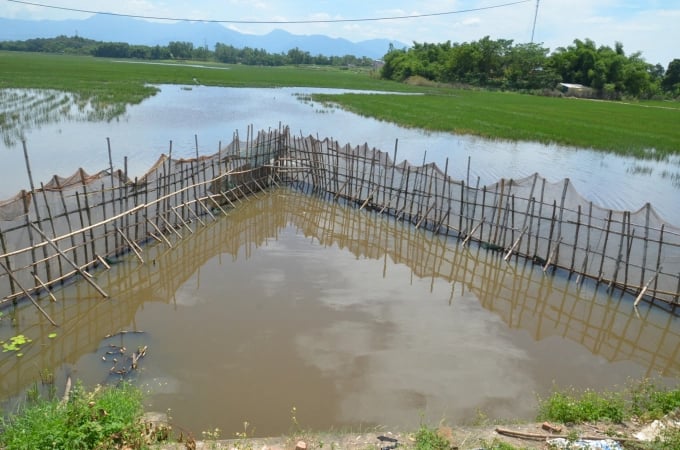
Model of rice and fish in Lap Thach district. Photo: Duong Dinh Tuong.
Vinh Phuc ranked first on the list of provinces that did well in the IPM program from 2015 to 2020, with an investment of VND 3.7 billion, while nearby province Phu Tho ranked second with an investment of VND32.4 billion.
Apart from direct investment in IPM in Vinh Phuc, there are many additional clean agricultural assistance initiatives, two of which are particularly noteworthy: For the year 2020-2022, the budget allocated VND 28 billion for organic and organic agricultural production, with an annual size of 1,664ha for vegetables alone. Since 2016, VietGAP vegetable production has been underway; in particular, in 2021, it will expand to 1,840 hectares for VND 15.4 billion.
Nguyen Ba Tue, Director of the Vinh Phuc Plant Protection Sub-Department, informed me that the province now has 255 establishments selling pesticides, and that pesticide use has decreased by at least 50% over the last decade, to 113 tons with an average of 2.6kg per ha per year, of which 0.9 kg is biological. The total quantity of fertilizer utilized was 238,955 tons, of which 45.6 percent were inorganic and 54.4 percent were organic and biological. For many years, the incidence of damage caused by pests and diseases has been very low, but agricultural yields have remained fairly high due to the establishment of an integrated pest management program IPM.
There was a time in Vinh Phuc when the IPM program was suspended for many years, courses were not conducted, and the IPM Center inside the Sub-Department was converted into an IPM Department and subsequently abandoned due to the organizational structure. To compensate, the Sub-department directed that all kinds and seasonal structures print over 8,000 pages of agricultural calendars and distribute them from the village head to the cultural house, ensuring that each meeting catches people's attention with specific suggestions.
In 2017, the IPM program was resumed, the unit continued to provide training to important farmers, and more than 62% of the rice field now uses SRI to assist sustainably decrease pesticide use...

(VAN) Deputy Minister Nguyen Quoc Tri also expressed his hope that Cuba will soon overcome its current challenges, attain food security, and further expand cooperation with Vietnam.

(VAN) The project contributes to enhancing the resilience of communities vulnerable to the impacts of climate change, with a primary focus on local women.
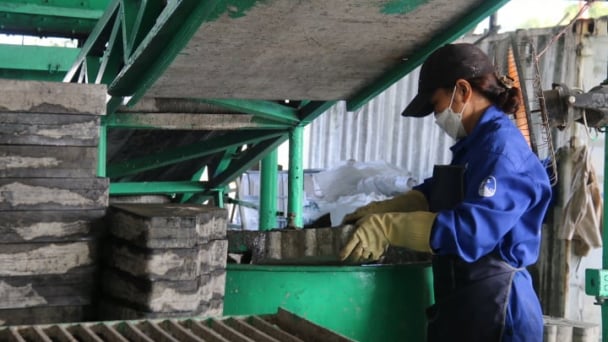
(VAN) Green materials help save energy and resources. However, after more than 10 years, Vietnam has only developed over 200 green buildings with more than 6 million square meters of floor space.

(VAN) Vietnam - Thailand Business Forum 2025: One plus one on three connects, marking a milestone in the comprehensive strategic partnership between the two nations.
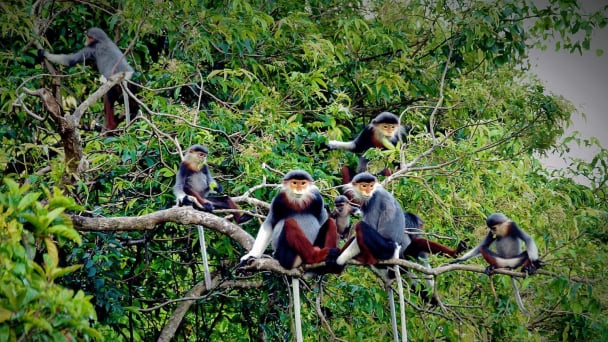
(VAN) The United Nations designated 22 May as the International Day for Biodiversity 2025 with the theme 'Harmony with nature and sustainable development.'
![Multi-channel, multi-directional Vietnamese agricultural markets: [8] A national strategy is needed](https://t.ex-cdn.com/nongnghiepmoitruong.vn/608w/files/phucpm/2025/05/15/1435-thi-truong-nong-san-viet-da-kenh-da-huongbai-8-can-mot-chien-luoc-quoc-gia-084750_728.jpg)
(VAN) The Chairman of Hung Nhon Group shared: ‘Opening up and tapping into new markets is the right and strategic direction for Vietnam's agricultural sector.’
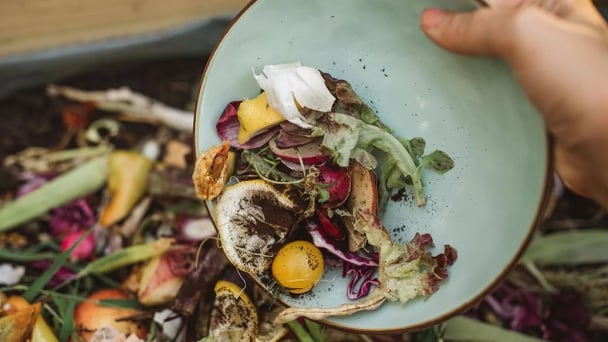
(VAN) Food waste has become a serious issue in modern society, especially in rapidly urbanizing and developing cities like Hanoi.